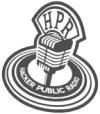HPR2197: Why you should not say Free Software
Hosted by Ken Fallon on 2017-01-03 00:00:00 Download or Listen
HPR Comments
Mastodon Comments
More Information...
Copyright Information
Unless otherwise stated, our shows are released under a Creative Commons Attribution-ShareAlike 3.0 Unported (CC BY-SA 3.0) license.
The HPR Website Design is released to the Public Domain.
